With one week to go before the legislative elections, L’Orient-Le Jour takes the pulse of the country through immersive reports from the four corners of Lebanon. Six journalists and three photographers spent time with the inhabitants of different regions to understand how the economic crisis has affected them, and to see how the thawra has affected their mentalities — or not. In eight reports, we will tell the story of Lebanon in Lebanon. Today, in the third episode, we visit Mazraa, a district of Beirut where several Lebanons meet. Sunnis, Greek Orthodox and Shiites often share the same sorrows, but not always the same fears.
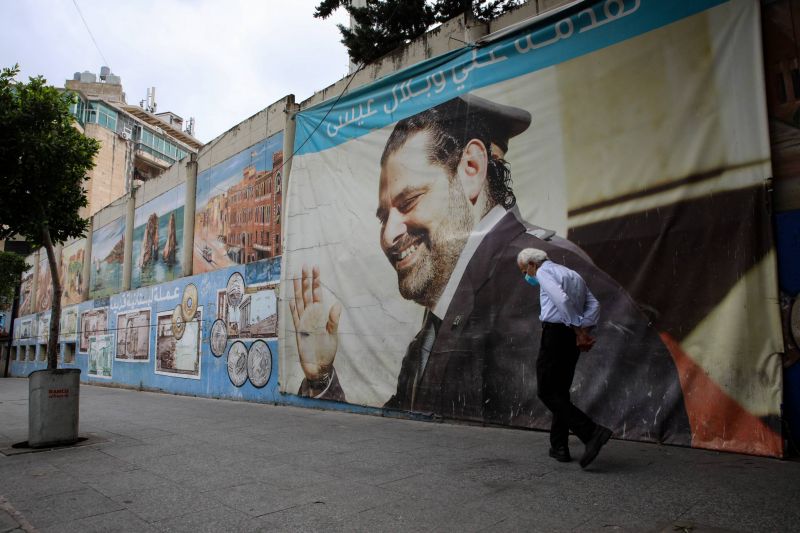
The political withdrawal of Saad Hariri has plunged some 98,000 voters in Mazraa into uncertainty about the next legislative elections.
Sitting on a plastic chair in front of an atayef (pastry) shop in Mazraa, Mohammad has just opened his blue eyes. Out of his pocket, he takes his notes about the electoral lists that are running in the Beirut II constituency, 10 in all, as if it were a soccer team’s ranking for the upcoming games.
Several candidates could please him. Any ‘ibn (son of) Beirut’ or those “offering services, because that’s all the people need.”
However, he will not vote. The withdrawal of his zaim, former Prime Minister Tammam Salam, has been convincing enough for him to abstain. He is far from being the only one. Never before has such ambiguity prevailed on the way this neighborhood of 98,000 registered voters approached the elections.
In this neighborhood in Beirut several Lebanons meet. Sunnis, Greek Orthodox and Shiites, whose number increased after the war, often share the same sufferings, but not always the same fears.
It is despair that holds the reins. All are convinced that nothing will change. They are all angry at the political class. But as soon as you scratch the surface, the “Kellon yaani kellon” (all of them means all of them) slogan of the October 2019 uprising gives way to deep-rooted allegiances, or at least, to strong political preferences.
In this neighborhood, a few weeks before the May parliamentary elections, the rise of the Shiite community and the withdrawal of Saad Hariri from politics are on everyone’s mind.
In every street corner, the flags of the traditional parties are waving in the wind. At first glance, one could say that each party has a base in this neighborhood.
In Basta al-Fawqa, Burj Abi Haidar, in the perpendicular streets of Barbour that lead to Ras al-Nabeh, the Amal Movement’s colors impose themselves on the landscape.
The flag of Ahbash, a pro-Syrian Sunni party, is flying everywhere, mainly in Babour and Noueiri.
Electoral billboards of outgoing MP Fouad Makhzoumi are scattered across the area, except in Tariq al-Jadideh, Hariri’s stronghold. Despite his withdrawal, his photos are still hung.
Hariri’s orphans
The four walls of Mohammad Sammak’s office, a mokhtar (local official) in Tariq al-Jadideh, evoke a nostalgia for a bygone era. Rafik Hariri’s photos are everywhere. “One hundred percent Hariri,” Sammak said.
On his desk, there are stamps that he now buys on the black market. “Everything is [paid for] from our pockets now and we can’t raise the prices too much,” said this father of two daughters, who have US citizenship.
One of them is in the US. The other is finishing her studies at LAU before she joins her sister. A separation forced by the crisis that has plagued Lebanon for more than two years.
Like many voters of the Future Movement, he chose to abstain. “Even if we have 120 MPs, we can’t change anything. There is a pen facing the weapons on the table,” he said, in reference to Hezbollah.
Next to his desk, a map of Tariq al-Jadideh. “Ana ibn el manta’a [I grew up in the neighborhood],” he proudly said. A corner, “that has maintained its Sunni and political identity, unlike the rest of Beirut.”
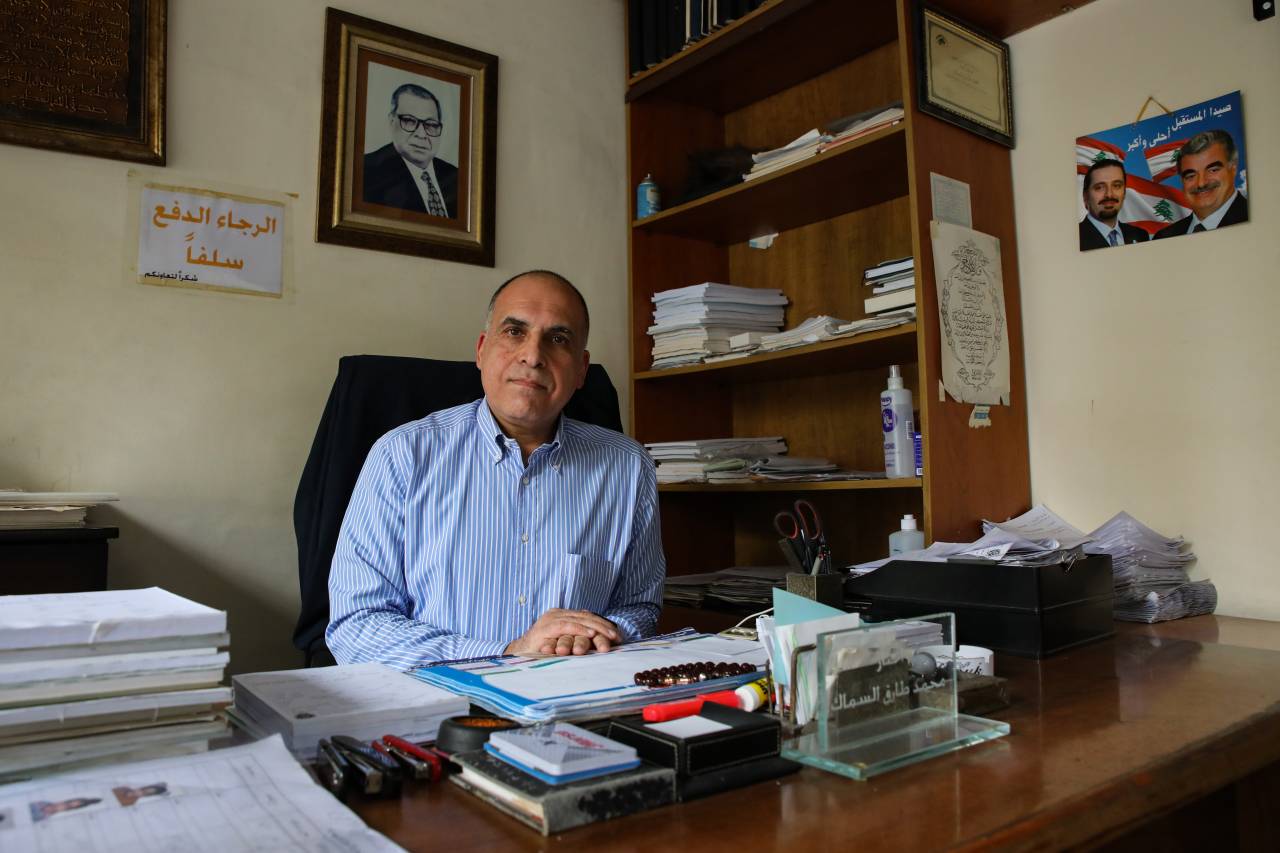 Mohammad Sammak, mukhtar to Tarik Jdide, does not intend to vote. “We have only a pen to oppose to weapons”, says this partisan of the current of the Future.
Mohammad Sammak, mukhtar to Tarik Jdide, does not intend to vote. “We have only a pen to oppose to weapons”, says this partisan of the current of the Future.
“Maalem Mounir.” That’s how he is known in Tariq al-Jadideh. This bodybuilder began working at the age of 10, in Tariq al-Jadideh, near Malaab al-Baladi, where he grew up.
It is here that he made a name for himself. “I am a true Beiruti. I’ve seen everything,” said this former weightlifting champion. The youngsters at the weight-lifting room, where he goes often, envy him. “Their jealousy is going to jinx me one day.”
“Ya mahla el harb [The civil war was easier to live in]. What we’re going through now is much worse,” he said.
“Back then, there was a lot of money out there. If someone’s car got damaged by a shell, he would fix it the next day. Now I do small repairs for LL10,000.”
In his modest workshop, plunged in darkness due to power cuts, his tools are put away. It’s been two weeks since any customer came through the door.
On Oct. 17, 2019, he took to the street in Beirut in protest against the political class. But today, the thawra (revolution) candidates do not convince him. “They can’t even get along, and they want me to trust them,” he said, in reference to the disunification of the opposition lists in the May elections.
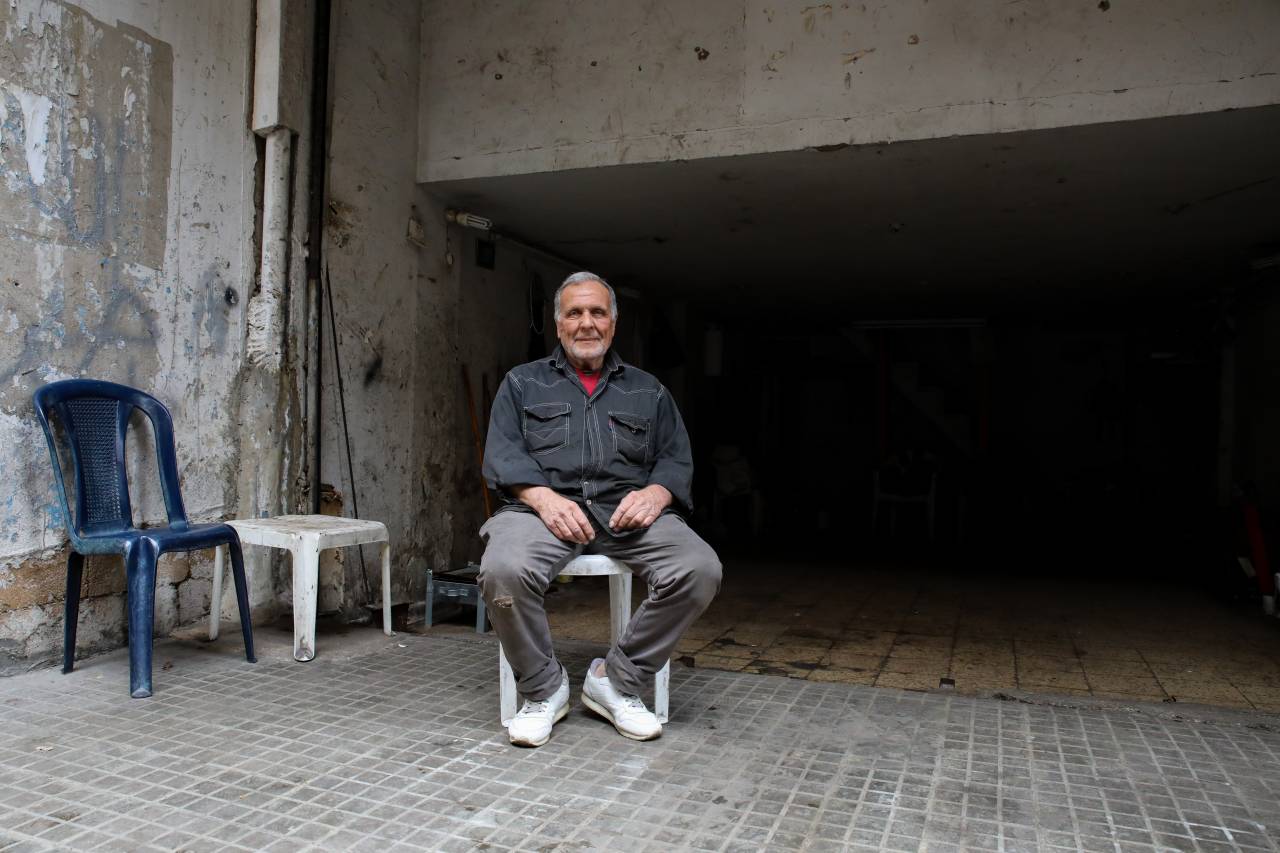 “Saad will come back, right? He must have a plan, ”says Maalem Mounir, a former sympathizer with the Future movement.
“Saad will come back, right? He must have a plan, ”says Maalem Mounir, a former sympathizer with the Future movement.
In 2018, he and his family rushed to the polling station at the last minute, thinking that the March 8 camp (Hezbollah, Amal, Ahbash) could win the elections.
“I voted for Saad Hariri reluctantly. I did it for his father.” In the end, it was the Future Movement’s list that amassed the most seats.
Mounir still does not understand Hariri’s decision to withdraw from politics. A decision that reshuffled all cards in this constituency.
“Saad will come back, right? He must have a plan,” he said. For even if he said he is not sectarian and cites the example of Rafik Hariri who “helped everyone without exception,” the possibility that his constituency’ political color changes scares him.
“The Sunnis are lost. Everything must be done to prevent Hezbollah from winning this year,” said the Maalem, although he does not believe that the elections will actually take place.
‘We already have our own Taliban’
The sound of bells resounds in Barbour. The church, located at the heart of the neighborhood, is surrounded by all kinds of businesses. It recalls the historical presence of the Greek Orthodox, albeit a minority presence, in this land.
Some of them fled during the Civil War. Others stayed, like Michel Saliba. “We are loved here,” the manager of Ahwat Saliba said.
“If you did not pass by here, it means that you have never been to Mazraa,” said Assad Saliba, the co-manager, in his 50s.
Smoke from tobacco products fills the cafe. In the cloud of smoke, there are many wrinkled faces. Ahwat Saliba is the old-timers’ favorite corner. Sitting around a round table with a cigar, a cigarette or with the tip of the hookah between the lips, they play cards, trying, unsuccessfully, not to get too excited.
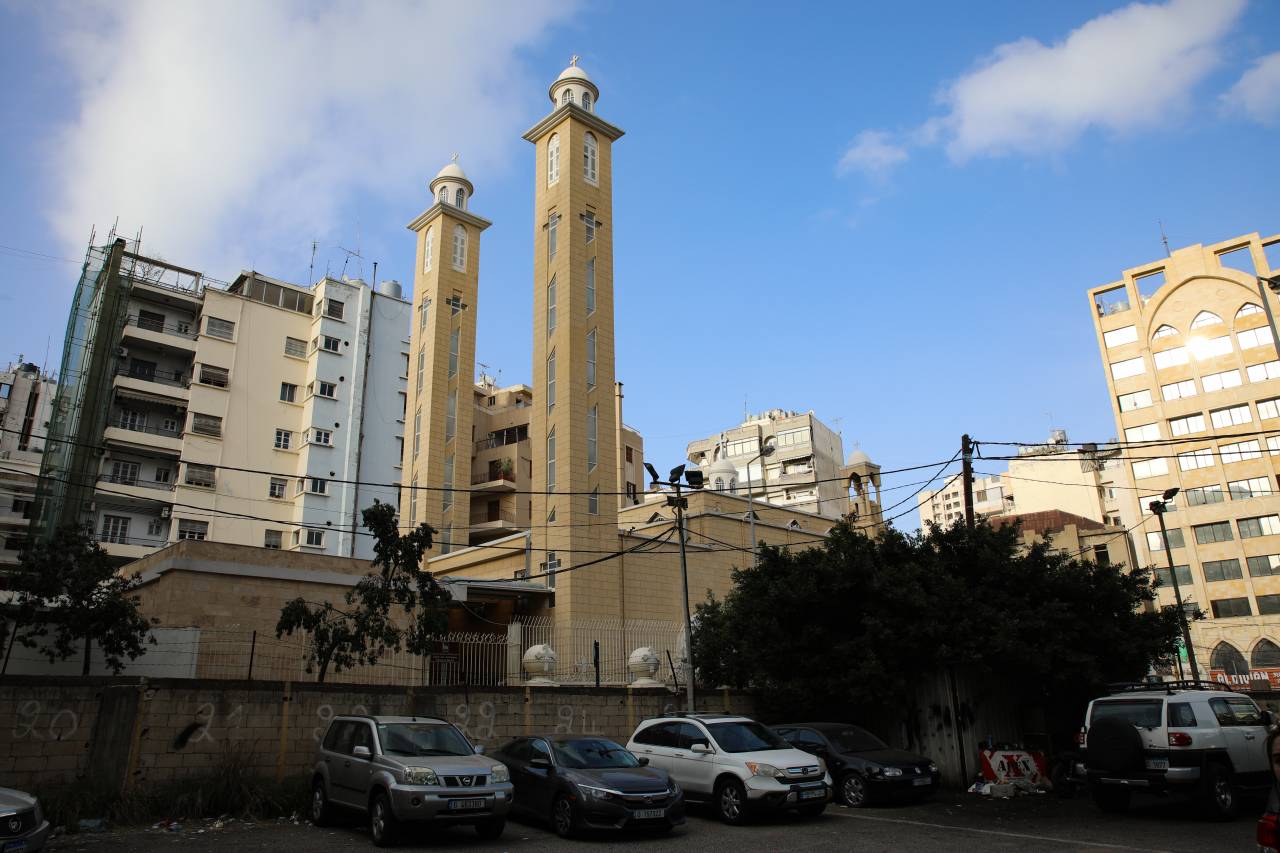 The Greek-Orthodox church, planted in the middle of Mazraa, recalls the historical presence of the Christian minority in this district.
The Greek-Orthodox church, planted in the middle of Mazraa, recalls the historical presence of the Christian minority in this district.
In this cafe that opened more than 70 years ago, nostalgia for the old Beirut prevails. Photos of the city before the war are scattered on the walls, along with a photo of the institution’s founder.
“We all used to know each other here. There were gardens, old buildings, water and electricity around the clock. Now everything is difficult with the crisis, but luckily, I still have a job,” recalled Michel, a 69-year-old accountant.
“The demography has changed here. Before, there was a Sunni majority and we were a Greek Orthodox Christian minority. Now there are the Shiites and Sunnis, and then the Christians,” Assaad said.
He has never missed an election. He usually votes for the Greek Orthodox candidate of the Future Movement. But Hariri’s withdrawal has been a “shock” to him.
In the cafe, Khalid*, a 40 year old, starts to sing. “Tell him to shut up, we can’t hear each other anymore,” Michel told Assaad.
The conversations about the upcoming elections are still in full swing. “Hariri withdrew, he told us to stop, so I’m following the guidelines,” Khalid said. “He joined politics with his money and he is the only one who left it poor.”
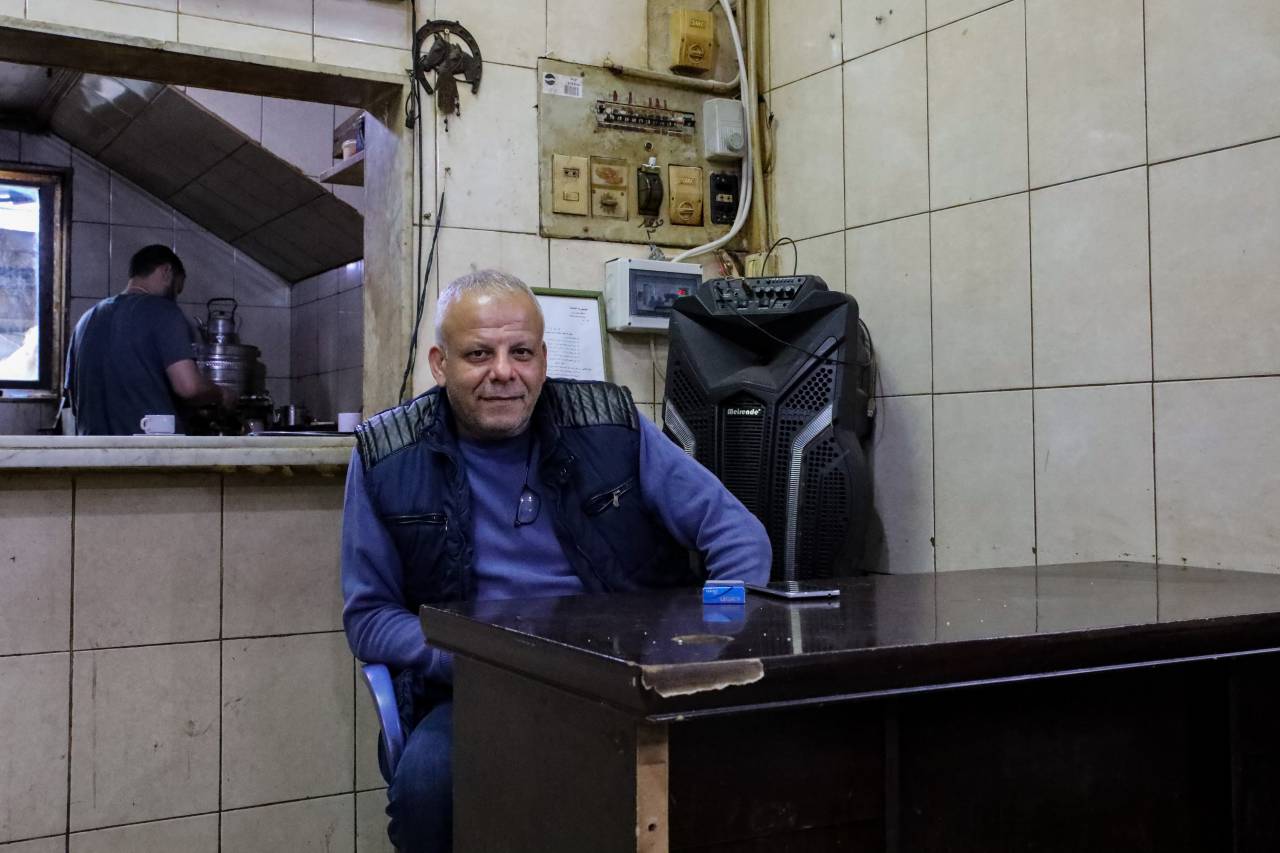 “We have our own Taliban,” says Assaad Saliba, co-manager of Ahwat Saliba, an institution in Mazraa.
“We have our own Taliban,” says Assaad Saliba, co-manager of Ahwat Saliba, an institution in Mazraa.
For these elections, the Saliba family intends to vote for Fouad Makhzoumi’s list, which includes Zeina Majdalani, who hails from a large Greek Orthodox family in Mazraa. “She is one of our relatives, so we will vote for her,” said Michel.
But Assaad does not believe in change. “The decision is not in the hands of the MPs. We know who is in charge of this country. We will end up like Afghanistan. We already have our own Taliban. ”
‘Hezbollah has eaten us’
Corniche el-Mazraa looks like Ali Baba’s caves. The delivery boys on scooters stop for a moment to pray in the Gamal Abdel Nasser Mosque. On the side of the intersection, a beggar carries a toddler, skin and bones, like a bag. Nothing wakes him up. Not even the urban fanfare of honking horns, the squealing tires and roaring engines. Sometimes it’s the sound of bullets that resounds.
“I’m not sectarian, but they force you to be,” Dina, 25, who lives next door said. She is referring to the Shiites, with no exception. She is no longer able to tell the difference. Here, May 7, 2008 — when Hezbollah and its allies took over several neighborhoods in Beirut by force — has left its mark.
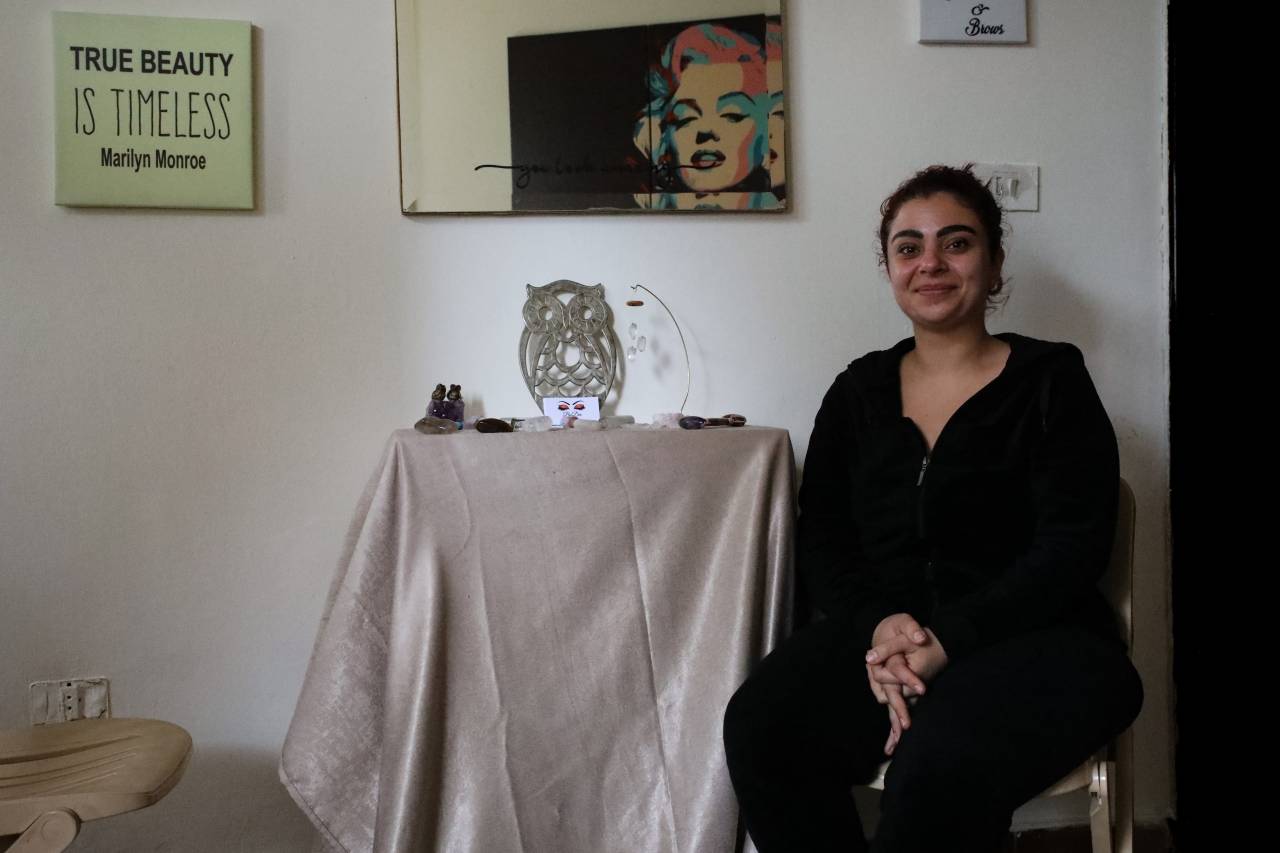 “I’m not sectarian, but they force you to be,” says Dina, who does not intend to vote.
“I’m not sectarian, but they force you to be,” says Dina, who does not intend to vote.
During the thawra, “they came here, broke everything and shot everywhere,” said the young woman, who witnessed the scene from her window. Since that day, her four-year-old daughter has been having panic attacks and screaming when she sees her mother at the window.
Due to health complications, her daughter had to undergo three operations. Dina has to ask her relatives to bring her the necessary medication from abroad.
“I wonder how much longer we can still hold out,” she said before bursting into tears. “I’m 25 years old, and I’ve been on antidepressants since the beginning of the crisis.” Dina feels that her neighborhood has been snatched away from Beiruti families.
“Hezbollah has eaten us, it has armed everyone,” It is not only Hezbollah that she has in her sights. The Palestinians and Syrians too. “All the Lebanese are going to be kicked out. They are the ones who are going to take the country.”
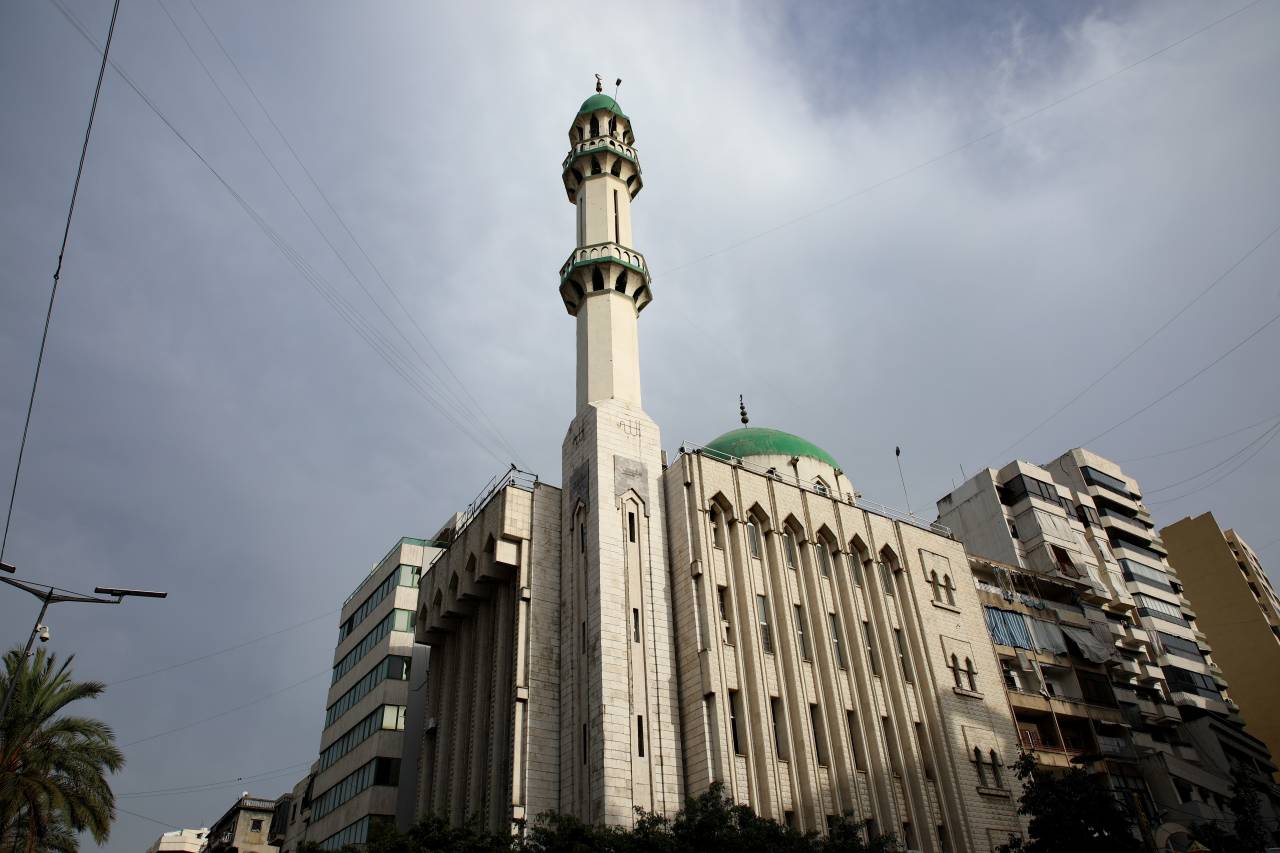 The Jamal Abdel Nasser mosque at Corniche al-Mazraa.
The Jamal Abdel Nasser mosque at Corniche al-Mazraa.
‘Here, Amal controls the street’
In the windows of a series of stores, gold jewelry is on display. In souk el dahab (gold), the few customers who still venture into these shops, once crowded, haggle over prices. Others want to sell their jewelry.
Passers-by slalom between the cars stuck in traffic. With his superhero balloons, Abed, 11, does not go unnoticed. This young Syrian works on the street. “The people are not very nice…” he said. He doesn’t have time to finish his sentence.
Fadi* interrupts the conversation to launch into a tirade against Syrian refugees. “He lives better than I do,” he said. In his hand, the latest mobile phone. As for Abed, he wears only a simple sweater to protect himself from the violent wind.
He lowers his eyes and looks down at his toes sticking out of his sandals. The contour of his lips, which he bites, is completely dry.
The forty-year-old doesn’t even glance at him as he continues his tirade. “They give birth to 10 children and throw two or three of them into the street to die.”
Everything goes into it: the Syrians who live better than the Lebanese, who steal the jobs of the population, and who now outnumber the people… “In two years, they will create a party, take up arms and make a coup d’état, believe me.”
Abed still doesn’t dare to say a word. Fadi was also “thrown” into the street by his parents at the age of 12. “I worked in the buses in Ain el-Mreisseh. I am a self-made man.” Today, he owns a jewelry store. With no employees? He smiles, embarrassed, like a child who has been caught red-handed.
“I have a Syrian employee. For $100 a week, he does everything I want. I could employ a Lebanese but they do not want to work.” he continues his monologue.
This time, it’s the country and the Lebanese who get the blame.“If a war breaks out between Lebanon and Israel, I’ll be with Israel,” said this father of three. This hatred is fueled by the feeling of losing his country which he perceives to be “in the hands of these warlords and zaims.”
For him, Saad Hariri and the Mufti are “no better than the sole of his shoes.” While he dares to insult them, he immediately lowers his voice when talking about Amal and Hezbollah. “Here, Amal controls the street. You need to go through them, even to get power from the neighborhood’s generator.”
‘The Sunnis are to blame’
The flags of Nabih Berri’s party drip onto the lampposts of Ras el-Nabeh. These “ornaments” do not even spare the trees. Amira*, who lives in the area, doesn’t like to call them the “Shiite tandem.” “I am pro-resistance,” said the woman, who participated in the March 8 demonstrations, and who does not perceive with great interest the October 2019 uprising.
“It was nothing,” said this former employee of the Ministry of Telecommunications. But, since the beginning of the crisis that has translated into her retirement being stuck in the banks, she has been “disgusted” by this political class and its game. With one exception: Hassan Nasrallah. She adores him. “His ideology and his logic too.”
From the balcony of Amira’s apartment, “three generations grew up seeing the bombings and conflicts that have shaken the capital,” she said, while sitting in her living room.
For her, May 7 was the Sunnis’ fault. “I saw them from my window, they started it. Anyway, they touched the nerve of the resistance,” she said, in reference to the Fouad Siniora cabinet’s decision, supported by Druze leader Walid Jumblatt, to dismantle Hezbollah’s parallel telecommunications system.
“It is the resistance that allowed us to live in our country and survive,” said this woman, who votes in the Beirut II constituency, although she hails from the South.
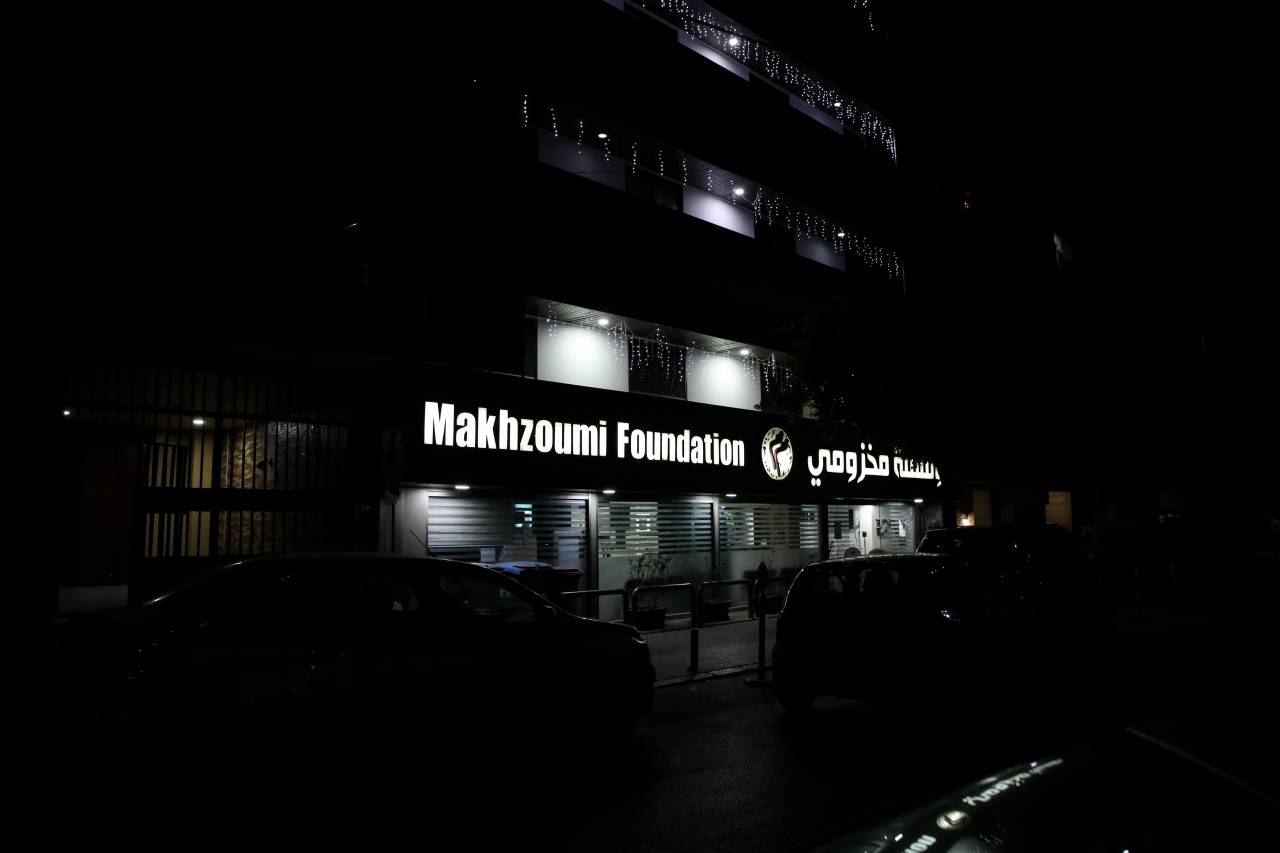 Clientelism is raging in Mazraa on the eve of the legislative elections.
Clientelism is raging in Mazraa on the eve of the legislative elections.
Someone knocks on the door. Her neighbor informs her that the Makhzoumi Foundation is distributing LL750,000 worth of vouchers. “They called me too, but I told them I wasn’t going to vote.”
Although she is not interested in the elections, she made a forecast. “It is true that the Shiites were a minority in the neighborhood, but they are imposing themselves now.”
For her, in the Beirut II constituency, it is Hezbollah’s turn to win the battle. In any case, whether he loses or wins, “Hassan Nasrallah will never give up his arms.”
‘The thawra, an American scheme’
All Walid* wants is a plan for Lebanon’s rescue. “I want a clear program. Today, we feel like the candidates don’t live here. There’s nothing about our standard of living. All we hear are slogans without substance and two discourses: with or against the weapons,” of Hezbollah, said this 78-year-old man in his apartment in Burj Abi Haidar.
His wife, Zahra*, is by his side with her walking stick. She is Sunni. He is Shiite. “We got married for love.” That’s the only time she smiled. Zahra has a heavy look in her eyes. Although the elections are approaching, no candidate has knocked on their door.
Not only has her life changed, but that of her daughter, a teacher, too. The latter had to move in with her parents, along with her child and her husband.
“She helps us with a monthly salary of LL2 million,” said her mother. The medication bill of these parents exceeds LL2 million. Sometimes, it is their son who sends them money. Other times, they find themselves forced to reach out to NGOs.
“Previously, we were the ones helping those in need,” said Ahmad.
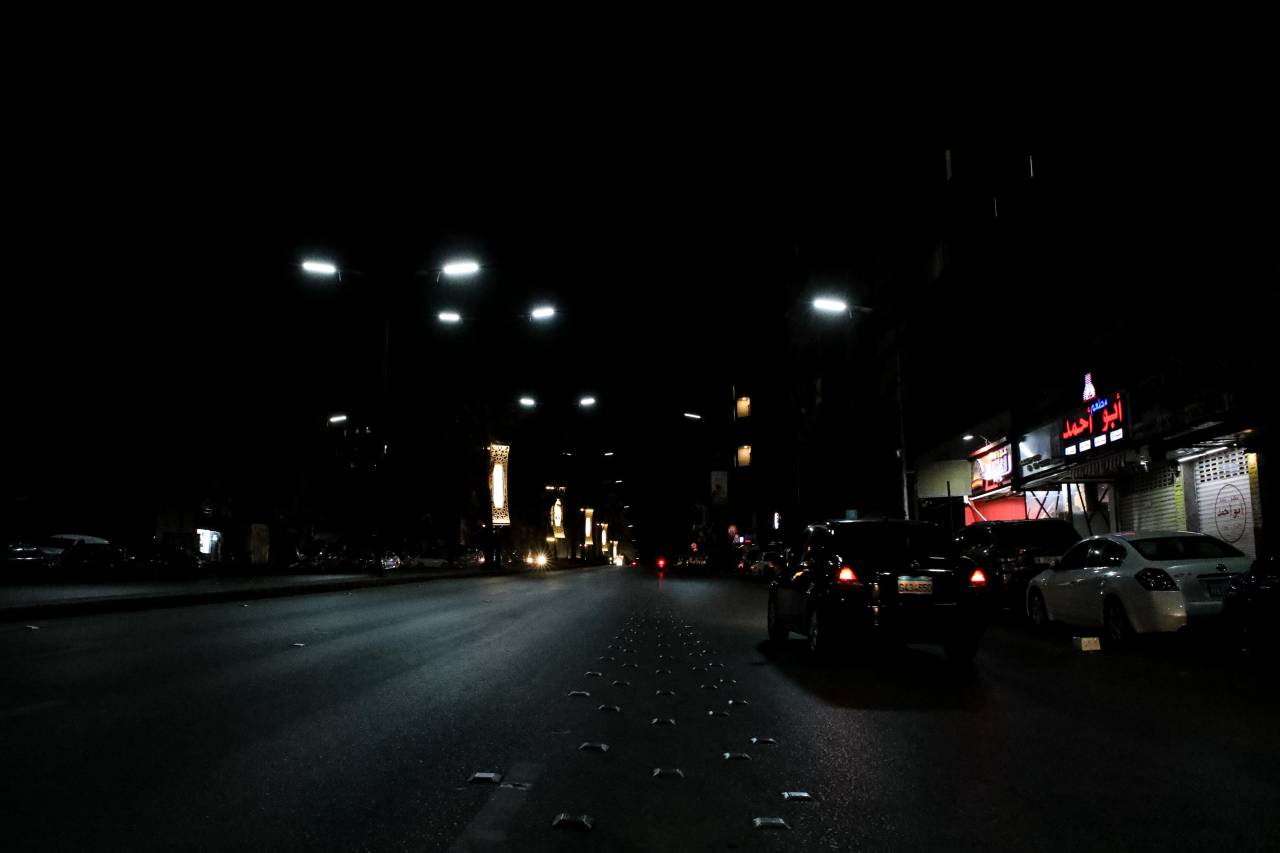 Corniche el-Mazraa is the arena of conflict between supporters of the Future movement and Hezbollah and Amal.
Corniche el-Mazraa is the arena of conflict between supporters of the Future movement and Hezbollah and Amal.
These retired teachers say they are neither with the March 8 nor March 14 camps, but one can tell they are a bit of both when listening to them. They are against the thawra “because it was an American plan,” Zahra said. They are “with the resistance against Israel,” because “one is forced to be when one has lived what I have lived,” explained Walid, originally from the South, who votes in the Beirut II constituency.
Both had cast their ballots for Rafik and Saad Hariri in the past. “We thought that Rafik had a project but the results were not up to the expectations,” said Walid, who added that two of his children were granted a scholarship from Rafik Hariri to study at the AUB.
Today, Walid does not close the door entirely to the elections “We’ll see on election day.” But if no one has a program, his vote will go to Hezbollah.
Ohio casinos, racinos take in $207 million in gambling revenue in July
Ohio’s casinos and racinos took in $206.7 million in gambling revenue in July, just short of a record they set in 2021, but well ahead of pre-pandemic figures. Combined, the 11 facilities’ revenue was 2% short of the $211.2 million during July 2021. But revenue is up...
Hong Kong cuts Covid hotel quarantine to three days
Hong Kong will ease its Covid hotel quarantine requirements for people arriving from overseas, Chief Executive John Lee said on Monday. From Friday, those arriving in the city will have to stay at designated quarantine hotels for three days. They will then undergo...
Cost of living: People turning back to cash as prices rise
People are going back to cash to keep tighter control on their spending as living costs soar, according to new research by the Post Office. Post offices handled £801m in personal cash withdrawals in July, the most since records began five years ago. That's up more...
Jaguar Land Rover owner Tata Motors to buy Ford car plant in India
Indian automaker Tata Motors has agreed to buy a Ford manufacturing plant in the western state of Gujarat for 7.26bn rupees ($91.5m). The deal comes as Tata moves to boost its car production to meet demand. The deal between Tata's electric vehicle subsidiary and the...
Israel-Gaza: Ceasefire holds overnight after days of violence
A ceasefire between Israel and Palestinian militants held overnight, following three days of violence. Isolated weapons fire from both sides in the minutes before and just after the Sunday night deadline failed to derail the Egypt-brokered truce. At least 44 people...
Qantas asks executives to work as baggage handlers for three months
Australian airline Qantas has asked senior executives to work as baggage handlers for three months as it tries to tackle an acute labour shortage. The firm's head of operations is looking for at least 100 volunteers to work at Sydney and Melbourne airports. Tasks...
Lebanon tops list of world’s ‘angriest’ countries
Lebanon has become the angriest nation in the world, according to a global survey, reflecting the mood of despair, frustration and sadness that has enveloped the Arab country in recent years. The Global Emotions report by the US analytics and advisory company Gallup...
U.S. Senate Democrats approve big Biden economic deal; House to vote next
Democrats pushed their election-year economic package to Senate passage Sunday, a hard-fought compromise less ambitious than President Joe Biden’s original domestic vision but one that still meets deep-rooted party goals of slowing global warming, moderating...
Rainy start to the work week: Northeast Ohio’s Monday weather forecast
Showers are likely throughout the area on Monday with a slight chance for thunderstorms to develop throughout the day. The National Weather Service’s forecast calls for highs in the mid 80s tomorrow with overnight lows around 70. Rain chances continue on Tuesday with...
Evergrande gets $818m as football stadium land deal cancelled
Heavily-indebted Chinese property giant Evergrande says it will receive $818m after cancelling a contract to buy land rights for a new football stadium. Construction of the stadium started more than two years ago but has been hit by issues for months. The stadium was...
Alex Jones must pay $4m in damages for Sandy Hook hoax claims
Conspiracy theorist Alex Jones has been ordered to pay $4.1m (£3.3m) in damages after falsely claiming the 2012 Sandy Hook school shooting was a hoax. The parents of a victim have sought at least $150m in the Texas defamation trial against the Infowars founder. They...
Lebanese photojournalist Hasan Shaaban beaten, threatened with death
Lebanese authorities should immediately investigate the assault of journalist Hasan Shaaban and threats made against him, and hold those responsible to account, the Committee to Protect Journalists said Thursday. On the evening of Wednesday, August 3, a group of men...
Hezbollah video threatens Israel’s Karish gas field
A video produced by the Lebanese terror group Hezbollah and released on July 31 threatened the Karish offshore natural gas and oil field in the northern part of Israel’s Exclusive Economic Zone. It was posted on the Arabic website Central-Media.org, according to a...
Ohio COVID-19 cases dip this week in Ohio; weekly coronavirus update for Thursday, Aug. 4
For the first time in six weeks, the weekly number of COVID-19 cases in Ohio has dropped. The state of Ohio on Thursday reported 27,785 new cases of COVID-19 in its weekly dashboard update, down 2,091 from a week ago. Ohio has been over 10,000 cases per week, every...
Powerball winner worth $207 million sold near Pittsburgh; Thursday’s Ohio Lottery results
A single Powerball ticket from the Wednesday, Aug. 3, 2022, drawing was sold in a town near Pittsburgh and is worth an estimated $206.9 million. A Sheetz store in New Stanton, Pennsylvania, earns a $100,000 bonus for selling the winning ticket. New Stanton is just...
Suspect in shooting in Parma arrested in Florida
A man wanted in connection with a shooting Tuesday that sent a 28-year-old man to the hospital was arrested Wednesday in Florida, police say. Federal agents the U.S. Marshals Service and police arrested Gregory Alan Jones Jr., 22, in Jacksonville, Fla., according to...
Man dies after being shot while walking down Akron street, police say
A 29-year-old man is dead and a 19-year-old was wounded after they were shot while walking down a street Wednesday evening in the East Akron neighborhood. Police say the two men were walking along the 400 block of Chittenden Street at about 6:30 p.m. when at least two...
Taliban claim they weren’t aware al Qaeda chief was living in Kabul
The Taliban have claimed they were not aware that al Qaeda leader Ayman al-Zawahiri was residing in the Afghan capital of Kabul where the US said he was killed in a drone strike over the weekend. "The Islamic Emirate of Afghanistan has no information about Ayman...
$75 million Crypto Fund Launched in Dubai by Former PwC Executive
A crypto hedge fund has been established in Dubai for institutional investors by a former executive in charge of cryptocurrency at renowned accountancy and audit company PwC. A $75 million cryptocurrency hedge fund has been launched for institutional investors by the...
$6.8B In yield farming, the Fairfax County Pension Fund invests $70 million.
Recent investments by Fairfax totaling $35 million were made in the VanEck New Income Fund and Parataxis Capital, two multi-strategy digital asset investing companies. In an effort to increase profits, a $6.8 billion Virginia pension fund made investments in...
Submit your event
We will be happy to share your events. Please email us the details and pictures at publish@profilenewsohio.com
Address
P.O. Box: 311001 Independance, Ohio, 44131
Call Us
+1 (216) 269 3272
Email Us
Publish@profilenewsohio.com

